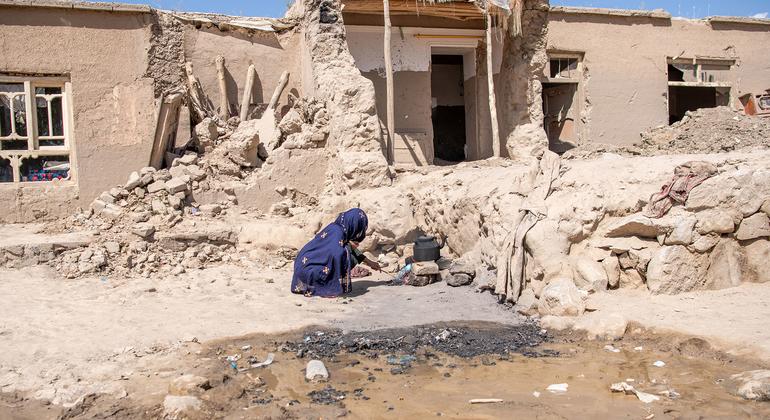The recent devastating floods in Afghanistan have left a trail of destruction in several provinces, with Nangarhar province, including its capital Jalalabad, being the hardest hit. This province had already suffered from devastating floods in April, compounding the challenges faced by its residents. Other affected provinces include Badakhshan, Kunar, Laghman, and Nuristan, all of which are grappling with the aftermath of the natural disaster.
During a daily press briefing in New York, UN Spokesperson Stephane Dujarric provided an update on the situation in Afghanistan. He reported that a reception center at Nangarhar’s Torkham border crossing, a primary entry point for people returning from Pakistan, has been heavily impacted by the storm. As assessments are ongoing, humanitarian partners have sprung into action, deploying nine mobile health and nutrition teams to provide assistance to those in need. Additionally, health partners have supplied medical supplies to Nangarhar Regional Hospital and Fatima Zuhra Hospital, ensuring that critical medical services are available to those affected by the floods.
The urgent needs of the affected population are becoming increasingly apparent as the extent of the damage becomes clearer. According to the UN Office for the Coordination of Humanitarian Affairs (OCHA), water, sanitation, and hygiene (WASH) facilities, along with 400 tents at a nearby camp, have been damaged or destroyed. Initial reports suggest that affected households are in dire need of access to food, shelter, health services, and WASH facilities. Tragically, forty people have lost their lives in the floods, with more than 340 others sustaining injuries. The situation is further exacerbated by the fact that many flood-affected families are now sheltering outside their destroyed or damaged homes, facing protection and health risks as a result.
In addition to the immediate needs for food, shelter, and medical assistance, there is a critical need for mental health and psychosocial support services for the most affected families. The trauma and stress of the natural disaster can have long-lasting effects on individuals and communities, underscoring the importance of providing comprehensive support to those in need.
The challenges faced by the flood-affected population in Afghanistan are further compounded by the presence of unexploded ordinances (UXOs) or mines in some of the affected areas. The UN refugee agency, UNHCR, has reported that these hazards pose grave risks to civilians, adding another layer of complexity to the humanitarian response efforts. Many families have also lost their sources of income due to the floods, pushing them into deeper vulnerabilities and increasing their dependence on external assistance.
Women and girls, in particular, are facing heightened risks in the aftermath of the floods. Reports indicate that they feel unsafe at water points, latrines, firewood collecting areas, and open spaces without shelter. Addressing the specific needs and vulnerabilities of women and girls must be a priority in the humanitarian response to ensure their safety and well-being in the challenging post-disaster environment.
Despite the urgent needs and challenges faced by the flood-affected population in Afghanistan, resources are lacking to adequately support those impacted. Mr. Dujarric emphasized the critical need for additional funding to address the humanitarian crisis unfolding in the country. To date, only $720 million has been received, which is less than a quarter of the $3 billion humanitarian appeal for Afghanistan this year. The funding shortfall threatens to undermine the relief efforts and hinder the delivery of essential services to those in need.
In light of the devastating floods and the urgent needs of the affected population, it is imperative that the international community steps up its support for Afghanistan. The provision of emergency assistance, including food, shelter, health services, and WASH facilities, is essential to address the immediate needs of those impacted by the natural disaster. Additionally, efforts must be made to address the long-term consequences of the floods, including the provision of mental health and psychosocial support services to help individuals and communities recover from the trauma of the disaster.
The presence of unexploded ordinances and mines in some of the affected areas further underscores the importance of ensuring the safety and security of civilians in the post-disaster environment. Clearing these hazards and providing information on how to avoid them are essential steps to protect the most vulnerable populations from harm.
As the humanitarian response to the floods in Afghanistan continues to unfold, it is crucial that adequate resources are mobilized to support those in need. The international community must rally together to ensure that the affected population receives the assistance and support they require to recover from the devastating impact of the natural disaster. Only through collective action and solidarity can we address the urgent needs of the flood-affected population and help them rebuild their lives in the aftermath of this tragedy.









